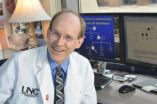(Press-News.org) Is it true that microbes cleaned up the oil spill in the Gulf of Mexico? Can bacteria really "eat" oil, and if so, how? To help clear up the confusion the American Academy of Microbiology has brought together the nation's leading experts to consider and answer some of the most frequently asked questions regarding microbes and oil spills.
"Long before the Gulf oil spill microbes evolved the ability to degrade the complex hydrocarbon mixture we call petroleum. They were already present in the Gulf of Mexico and ready to attack the oil when the spill occurred," says Ronald Atlas of the University of Louisville, a member of the steering committee.
The report entitled FAQ: Microbes and Oil Spills is based on the deliberations of over 20 of the nation's leading experts who came together for one day to develop clear answers to seven frequently asked questions regarding the role of microbes in the oil spill.
The questions considered by the report are:
What does it mean to say microbes can 'clean up' an oil spill?
Where do the 'oil-eating' microbes come from?
What do the microbes need in order to biodegrade oil and how long does it take?
How do dispersants and nutrients affect oil biodegradation?
Is it possible to engineer microbes so they work even better?
What happens to the oil after the microbes degrade it?
What happens to the microbes when the oil is all gone?
Most answers begin with a simple paragraph summarizing what is known, followed by a more detailed explanation. Spread throughout the report are sidebar boxes discussing issues related to the questions such as a brief introduction to oil or new ways to find oil-eating microbes.
FAQ: Microbes and Oil Spills is the first in a new series of reports designed to provide a rapid response to emerging issues. Traditionally Academy reports are based on multi-day colloquia after which the final report can take up to a year to develop. The FAQ series will be based on single-day meetings focused on specific questions after which a final report will be published in 2-3 months.
"The Academy FAQ reports explain complex microbiological problems in a timely, balanced format that is easily understandable by the public, the media, and policymakers," says Stanley Maloy of San Diego State University who moderated the colloquium.
###
A PDF of FAQ: Microbes and Oil Spills can be found online at: http://academy.asm.org/index.php/colloquia-reports/faq-series
The American Academy of Microbiology is the honorific leadership group of the American Society of Microbiology. The mission of the Academy is to recognize scientific excellence, as well as foster knowledge and understanding in the microbiological sciences. A full list of Academy colloquia reports can be found at http://academy.asm.org/colloquia. For more information about the American Society for Microbiology, visit http://www.asm.org.
END
Tel Aviv — Discovered by archaeologists in 1952, a 28-foot-high stone tower discovered on the edge of the town of Jericho has puzzled scientists ever since. Now, eleven centuries after it was built, Tel Aviv University archaeologists at the ancient site Tel Jericho are revealing new facts about the world's first "skyscraper."
Recent computer-based research by doctoral student Roy Liran and Dr. Ran Barkai of Tel Aviv University's Jacob M. Alkow Department of Archaeology and Ancient Near Eastern Cultures at the Lester and Sally Entin Faculty of Humanities sheds light on ...
Tampa, Fla. (Feb. 17, 2011) – Two studies published in the current issue of Cell Transplantation (19:12) investigate frontiers of islet cell transplantation for treating diabetes. Researchers in Milan, Italy re-examine the role of bone marrow stem cells in diabetic therapy and islet cell regeneration and Canadian researchers offer improved strategies for optimizing pancreatic islet culture in vitro.
Both studies are in the current issue of Cell Transplantation, freely available on-line at http://www.ingentaconnect.com/content/cog/ct/.
New perspectives on role of bone ...
Legal systems are necessary in any functioning society. Centuries ago, people realized that the only way to maintain a peaceful community was to develop a firm set of rules—laws—to punish transgressors. As laws have continued to evolve in societies around the world, psychological scientists have begun to investigate the psychological basis of many aspects of legal systems. A new special issue of Current Directions in Psychological Science, a journal of the Association for Psychological Science, presents the current state of research on psychology and law.
Many lawyers ...
Athens, Ga. – New University of Georgia research has found that a statin drug that is often known by the brand-name Lipitor may help prevent blindness in people with diabetes.
In a study using diabetic rats, lead author Azza El-Remessy, assistant professor in the University of Georgia College of Pharmacy, and her colleagues found that statins prevent free radicals in the retina from killing nerves important to maintaining vision. The results of the study are published in the March edition of the journal Diabetologia.
"The exciting part is that there are now treatment ...
Let algae do the dirty work.
Researchers at Rochester Institute of Technology are developing biodiesel from microalgae grown in wastewater. The project is doubly "green" because algae consume nitrates and phosphates and reduce bacteria and toxins in the water. The end result: clean wastewater and stock for a promising biofuel.
The purified wastewater can be channeled back into receiving bodies of water at treatment plants, while the biodiesel can fuel buses, construction vehicles and farm equipment. Algae could replace diesel's telltale black puffs of exhaust with cleaner ...
The effect of a high-fat meal on blood vessel walls can vary among individuals depending on factors such as their waist size and triglyceride levels, suggests new research at UC Davis.
The new research reinforces the link between belly fat, inflammation and thickening of the arterial linings that can lead to heart disease and strokes.
Triglycerides are types of fat molecules, commonly associated with "bad cholesterol," known to increase risk of inflammation of the endothelium, the layer of cells that lines arteries.
"The new study shows that eating a common fast food ...
When a team of scientists drilling near an Icelandic volcano hit magma in 2009, they had to abandon their planned experiments on geothermal energy. But the mishap could point the way to an alternative source of geothermal power.
"Because we drilled into magma, this borehole could now be a really high-quality geothermal well," said Peter Schiffmann, professor of geology at UC Davis and a member of the research team along with fellow UC Davis geology professor Robert Zierenberg and UC Davis graduate student Naomi Marks. The project was led by Wilfred Elders, a geology professor ...
What NIST-led innovation is estimated to have saved U.S. industry $6.1 billion over the past 20 years? Well, probably several, but, perhaps surprisingly, a new economics study* points to the development of "role-based access control," a computer-security technology fostered and championed by the National Institute of Standards and Technology (NIST) in the 1990s.
Role-based access control (RBAC) is the idea of establishing standard levels of access—"permissions"— to the various computing resources and networks of an organization that are tailored to specific employee roles, ...
A researcher at the National Institute of Standards and Technology (NIST) has invented a method of making high-temperature superconducting (HTS) cables that are thinner and more flexible than demonstration HTS cables now installed in the electric power grid while carrying the same or more current. The compact cables could be used in the electric grid as well as scientific and medical equipment and may enable HTS power transmission for military applications.
Described in a paper just published online,* the new method involves winding multiple HTS-coated conductors** around ...
CHAPEL HILL, N.C. - In the ten years since the human genetic code was mapped, expectations among scientists, health care industry, policy makers, and the public have remained high concerning the promise of genomics research for improving health.
But a new commentary by four internationally prominent genetic medicine and bioethics experts cautions against the dangers of inflated expectations – an unsustainable genomic bubble – and it offers ways to avoid it while still realizing "the true – and considerable – promise of the genomic revolution."
"This commentary is ...


